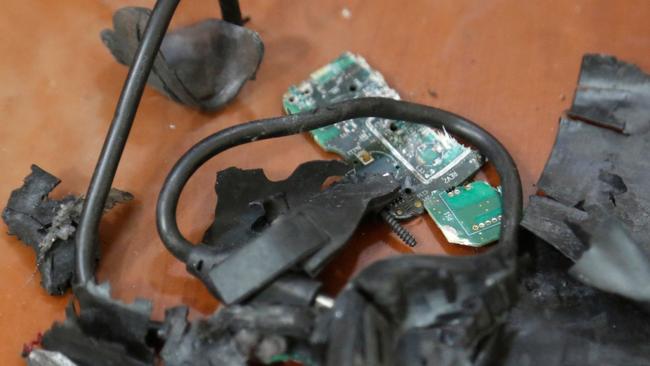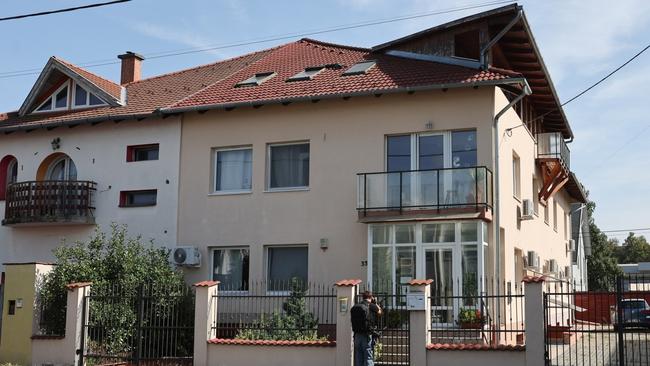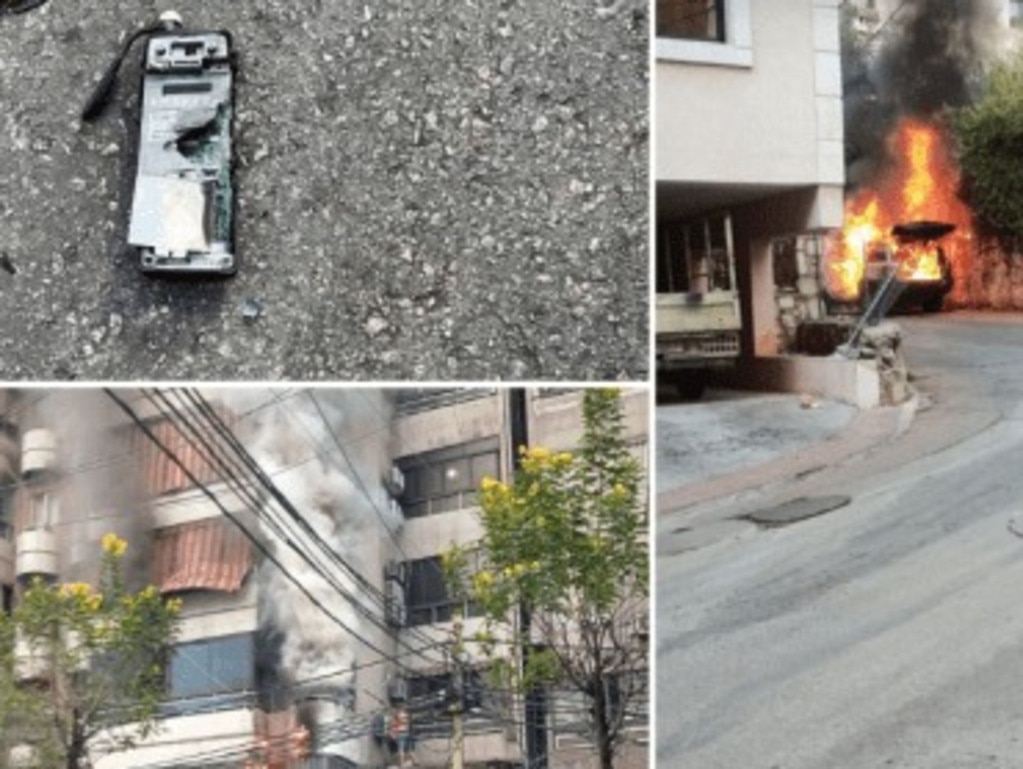Death by pager: How Mossad wreaked havoc on Hezbollah
The shell company, the mystery woman and the tiny metal balls … the unorthodox attack on the Lebanese militant group was one of the most audacious in the spy agency’s history.
At 3.30pm on a busy Tuesday in Beirut, pagers began beeping across the city. Over the course of an hour they sounded in markets where Hezbollah members were buying fruit, they sounded in shops and pavements and parks where they were enjoying the sunshine and they sounded in the hand of Iran’s ambassador to Lebanon, Mojtaba Amani.
They soon stopped beeping and started exploding. After receiving a coded error message that caused them to vibrate and ring for a few seconds, they detonated. Some users were peering at their devices when they blew up, like Amani, who was said to have lost an eye. Many were holding them, trying to clear the error message, causing devastating injuries to their hands.
Others, like Fatima Abdallah, nine, were innocent bystanders. She is believed to have died when she picked up her father’s pager seconds before it exploded in the Bekaa Valley.
By the end of the day several thousand Hezbollah members, from rank-and-file fighters to senior commanders, had been seriously injured. The death toll stood at 12, including two children.
The co-ordinated attack, said international observers, could have come from only one place: Israel and, in particular, its Mossad spy agency.

Even as Hezbollah buried their dead yesterday, more explosions were reported in the southern Lebanon, in Beirut and in the eastern Bekaa Valley, this time the result of handheld radios detonating. At least 14 more people were reported dead and another 450 injured, the Lebanese health ministry said.
Hospitals were inundated with casualties once again. Dr Salah Zeineddine, chief medical officer at the American University of Beirut Medical Centre, said that staff members had been put on standby for more casualties.
At one funeral in Dahiyeh, Beirut, mourners were told to turn off their phones and remove the batteries as panic spread. “Yesterday I witnessed an explosion first hand. I saw a pager explode on a man in a butcher shop close to my house. This is the second time I am witnessing an explosion. Everyone is really scared,” Firas, 39, who watched the funeral procession, told The Times.
The rigging of the pagers, according to Elijah Magnier, a Brussels-based senior political risk analyst, was designed to cause maximum damage. Magnier, who spoke to Hezbollah members who had examined devices that failed to explode, said they had included metal balls within or around the lithium battery, allowing the explosive force to propel the small metal fragments outward, significantly increasing the lethal potential of the blast.
“It is the stuff of films,” a UK official said, as speculation mounted as to how such an audacious and unprecedented attack could have been executed.
No talking on phones
Planning for the sophisticated operation may have begun as far back as February, five months into the war in Gaza, when the Hezbollah leader Hassan Nasrallah urged his members to stop using their smartphones. He described them as “spy gadgets” that could be used by Israel as a tracking tool to find and kill commanders. As a consequence, Hezbollah, which controls parts of southern Lebanon, regressed to pagers of the sort that had their heyday in the West in the 1980s.
Mossad apparently spied an opportunity. Hezbollah sought an order for as many as 5,000 of the devices, for use not just within Lebanon but in neighbouring Syria. How they selected the product remains unclear, but they ended up with devices thought to have been manufactured by a company based in Budapest, according to the Taiwanese company Gold Apollo, whose branding appeared on the detonated pagers.
Gold Apollo’s founder, Hsu Ching-kuang, said the devices were made under licence in Europe by a firm called BAC Consulting, using the Gold Apollo name. “The product was not ours. It was only that it had our brand on it,” he told reporters at the company’s offices in New Taipei.
Many of the pagers were its AR924 model, a compact, alphanumeric one-way pager. According to Tony McKenzie, a UK-based expert, there are two types of pagers, one with limited range and another, of the type used by Hezbollah, known as a “national” pager. “You can send a message to that pager from anywhere in that country,” he said. Communication is one way, with the pager only able to receive messages, and it is reliant on a service provider, such as a telecommunications firm. McKenzie suggested it was “dead easy” to send the same messages all out at once.
A Mossad cover story?

Mystery surrounds the manufacture of the pagers and the apparent Hungarian “middle man” revealed as the licence-holder to manufacture them.
The official address for BAC Consulting is a private residence on Szonyi Street in Budapest, which did not answer the phone calls or emails submitted by The Times yesterday. A woman working in the building told Hungary’s Telex news website that the house, used for several businesses, is used only as a postal address for BAC.
Hsu said that he negotiated the licensing agreement with a Taiwanese woman known only as “Teresa”, who claimed to be a local representative for BAC three years ago. “She had already flown several times to Europe,” he said. “From beginning to end, they never mentioned Lebanon.”
However, while a website for BAC Consulting, now taken down, was set up in 2020, the company was only legally established in 2022, a significant discrepancy in Gold Apollo’s account.
Accounts show that it registered £450,000 worth of sales and £27,765 in profit in its first year. But the Hungarian government said the company had no manufacturing or operational site in the country.
The owner of the company, apparently its sole employee, is Cristiana Barsony-Arcidiacono, who appears to be in her forties and describes herself as a “strategic adviser in innovation and internal affairs”.

Her LinkedIn profile, created in 2019, suggested she graduated in 2001 from Catania University in Italy, and went on to study further in London. Her CV claims “several years” of experience in Europe, the Middle East and Africa as a “strategic adviser,” but the only employer to confirm she had worked for them was the French National Centre for Scientific Research, based in Grenoble, which she left in 2011. An Instagram account for Barsony-Arcidiacono is filled mainly with life drawings and photographs of Hungary. A profile on another website, ResearchGate, describes her as a board member of the Earth Child Institute, a sustainable development organisation.
Barsony-Arcidiacono has denied any link to potential sabotage of Hezbollah devices, telling the American broadcaster NBC: “I don’t make beepers. I’m just the mediator. They got it wrong.”
However, a British security source suggested that the claims about licensing Taiwanese technology to Hungary “obviously doesn’t add up” and amounted to a “cover story”.
The source pointed out that the Israelis had close secret relations with the Taiwanese and the Hungarians. “This might have been a Mossad operation all along, with them eavesdropping [on] the Hezbollah pager network for intelligence up to now.”
Weaponising the pagers
One British security official said the most obvious explanation was that the perpetrators managed to intervene in the supply chain. Chris Hunter, a bomb disposal expert and former British Army officer, noted the blasts were consistent with 20 grams of high explosives in each device. Turning hundreds of pagers into bombs would be no easy feat, he said. “It would need to be done in a factory or lab conditions.”
Lebanese security sources indicated the pagers were altered “at the production level”, long before they entered Hezbollah’s hands. Analysts said indications pointed to Israel corrupting the devices before delivery then sending out a message causing them to explode almost simultaneously. “For Israel to embed an explosive trigger within the new batch of pagers, they would have likely needed access to the supply chain of these devices,” Magnier said.
John Bayliss, a former GCHQ official, said the fact BAC had its name printed on a piece of A4 and stuck to the glass door of the address lent credence to the suggestion that it was a front. He said it was possible that if Israel knew that the company that took Hezbollah’s order would outsource the manufacture to Europe then they could have set up a “dummy company” to supply the order and undercut any competitors.
Bayliss said the perpetrators could also have entered a warehouse covertly and either replaced the devices with ones containing explosives or modified them on site. Neither option would be beyond the realms of possibility for Mossad, which has a long history of daring, complex operations.
In effect, Hezbollah’s operatives may have been walking around with small bombs in their pockets for weeks before they finally detonated. A former Israeli official with knowledge of the operation told the Axios news website that Israeli intelligence services had planned to use the devices as a surprise opening blow in an all-out war to destroy Hezbollah, which has stepped up its rocket and drone attacks into Israel since the war in Gaza started.
However, in recent days Israel became concerned that Hezbollah might discover problems with the devices. Even as Amos Hochstein, President Biden’s top adviser, visited Israel on Monday, Binyamin Netanyahu and his top team had convened an urgent meeting to discuss the possibility of the operation being compromised.
Fears of escalation
All eyes were on Iran last night to see how it would respond to the attack on its most important proxy in the region. Fears of an outbreak of a regional war were felt on both sides of the Atlantic.
Hezbollah said it was carrying out a “security and scientific investigation” into the blasts and vowed vengeance.
The Times



To join the conversation, please log in. Don't have an account? Register
Join the conversation, you are commenting as Logout